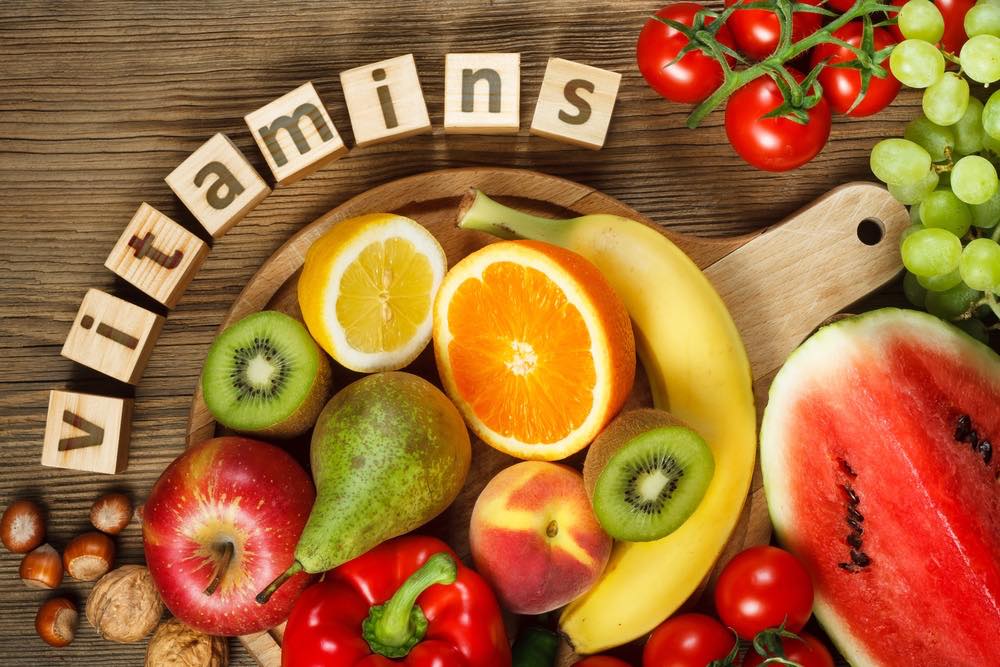A vitamin is an organic molecule (or related set of molecules) that is an essential micronutrient that an organism needs in small quantities for the proper functioning of its metabolism. Essential nutrients cannot be synthesized in the organism, either at all or not in sufficient quantities, and therefore must be obtained through the diet. Vitamin C can be synthesized by some species but not by others; it is not a vitamin in the first instance but is in the second. The term vitamin does not include the three other groups of essential nutrients: minerals, essential fatty acids, and essential amino acids.Most vitamins are not single molecules, but groups of related molecules called vitamers.
For example, vitamin E consists of four tocopherols and four tocotrienols. The thirteen vitamins required by human metabolism are: vitamin A (retinols and carotenoids), vitamin B1 (thiamine), vitamin B2 (riboflavin), vitamin B3 (niacin), vitamin B5 (pantothenic acid), vitamin B6 (pyridoxine), vitamin B7 (biotin), vitamin B9 (folic acid or folate), vitamin B12 (cobalamins), vitamin C (ascorbic acid), vitamin D (calciferols), vitamin E (tocopherols and tocotrienols), and vitamin K (quinones).
The most important vitamins, their sources and the results of their lack:
Vitamin A:
It is important to maintain healthy teeth, bones, mucous membranes and skin.
confiscation:
Green leafy vegetables, Egg yolk, Milk and dairy products, Liver, Beef, Fish, Carrots, Sweet potatoes, Pumpkin.
Deficiency leads to:
Night blindness, eye disorder leads to corneal dryness.
Vitamin D :
Helps the body absorb the calcium necessary to maintain healthy teeth and bones.
confiscation:
One of the most important sources of sunlight is that exposure to the sun for 10-15 minutes three days a week is sufficient to meet the daily needs of vitamin D and dietary sources rich in vitamin D: fatty fish such as sardines, cereals, milk and dairy products, eggs and mushrooms.
Deficiency leads to:
Ricks, Lin bone.
Vitamin E
It is an antioxidant vitamin and has a role in the formation of red blood cells.
confiscation:
Avocado, kiwi, green leafy vegetables, almonds, nuts, milk, eggs, whole grains, corn oil, sunflower oil.
Its decrease is uncommon.
Vitamin K:
Helps blood clotting.
confiscation:
Parsley, cabbage, grains, green leafy vegetables, fish, eggs, liver, beef, avocado, kiwi.
Deficiency leads to:
Ease of blood bleeding.
Thiamin (vitamin B1):
It helps to convert carbohydrates into energy which is important for heart health and nerve cells.
confiscation:
Yeast, grains, asparagus, turnips, potatoes, oranges, liver, eggs.
Deficiency leads to:
(Bronchitis and Vernicki Korsakov syndrome) affect the nervous system (walking problems, mental disorder, loss of feeling) or may affect the heart (rapid heartbeat, shortness of breath, swelling of the feet).
Ripoflavin (vitamin B2):
Works with other B vitamins to help grow and to form red blood cells.
confiscation:
Asparagus, Banana, Okra, Salad, Cheese, Milk, Milk, Eggs, Fish, Meat, Green Beans.
Deficiency leads to:
Lip breakage, vision changes, dermatitis.
Niacin (Vitamin B3):
Maintains healthy skin and nerves and has a role in lowering cholesterol.
confiscation:
Beef, liver, chicken, fish (tuna and salmon), milk, eggs, avocados, dates, sweet potatoes, carrots, broccoli, tomatoes, leafy vegetables, grains, nuts, mushrooms, legumes.
Deficiency leads to:
Pallagra: Vitamin deficiency is associated with symptoms including: diarrhea, mucous membrane inflammation, disorder of thinking.
Pantothenic acid (vitamin B5):
Helps in the metabolism of food (demolition and construction) and has a role in the production of hormones and cholesterol.
confiscation:
Meat, whole grains, broccoli, avocado, milk, mushrooms, potatoes, poultry.
Deficiency leads to:
Tantal or Almdalan.
Bayeridoxin (Vitamin B6):
Helps to form red blood cells and maintains brain functions and has a role in protein-based chemical reactions.
confiscation:
Meat, bananas, whole grains, vegetables, nuts.
(canning and freezing reduces vitamin content)
Deficiency leads to:
Anemia, peripheral neuropathy.
Biotin (Vitamin B7):
It is important because it helps in the metabolic processes (construction and destruction) of carbohydrates and proteins and is important in the production of hormones and cholesterol.
confiscation:
Chocolate, cereals, egg yolk, milk, nuts, liver, yeast.
Deficiency leads to:
Inflammation of the intestine, dermatitis.
Folic acid (vitamin B9):
Helps to form red blood cells with the help of vitamin B12 and helps to produce DNA important for cell growth and function.
(Pregnant women should take vitamin B9 because their deficiency causes a defect in the fetal spine.)
confiscation:
Broccoli, orange, green leafy vegetables, peanut butter, lentils, liver, sunflower seeds.
Deficiency leads to:
Fetal disorders in pregnant women who are deficient in this vitamin.
Syanokopilamin (vitamin B12):
Important for metabolism (demolition and construction) helps to be red blood cells and maintains the integrity of the central nervous system.
confiscation:
Fish, oysters, meat, poultry, eggs, milk, dairy products.
Deficiency leads to:
Anemia.
Vitamin C (ascorbic acid):
Anti-oxidant helps to maintain the health of the gums and teeth, helps heal wounds, and helps the body to absorb the tubercle and maintain tissue health.
confiscation:
Broccoli, cabbage, potato, spinach, strawberry, tomato, tomato juice, citrus, plum.
Deficiency leads to:
Anemia, Easy Bruising.
The best way to get the necessary amount of vitamins is achieved by eating a balanced diet and if not enough of the food can be supplemented you can take vitamins in the form of pills and moderate in the amount of vitamins consumed by the individual because too much is not good , so you should consult your doctor about the vitamins that will be consumed by the individual.


